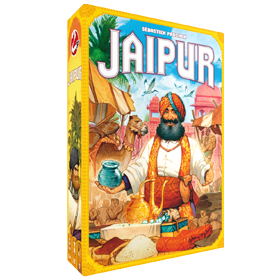jaipur
 جايبور ... أنت تأمل أن تصبح تاجر مهراجا الشخصي من خلال أن تكون أكثر ثراء من خصمك في نهاية كل أسبوع (الجولة).
جايبور ... أنت تأمل أن تصبح تاجر مهراجا الشخصي من خلال أن تكون أكثر ثراء من خصمك في نهاية كل أسبوع (الجولة).
للقيام بذلك ، قم بجمع واستبدال البضائع في السوق ، ثم بيعها مقابل روبية. إذا تمكنت من جمع صفقة جيدة حقًا ، فستحصل على مكافأة إضافية!
عدد اللاعبين: 2
مدة اللعبة: 12 mn
تعقيد: 2 / 5
العب jaipur و 1229 ألعاب أخرى online.
لا يلزم التنزيل - العب مباشرة من متصفح الويب الخاص بك.
مع أصدقائك وآلاف اللاعبين من أنحاء العالم.
مجاني.

العب jaipur و 1229 ألعاب أخرى online.
لا يلزم التنزيل - العب مباشرة من متصفح الويب الخاص بك.
مع أصدقائك وآلاف اللاعبين من أنحاء العالم.
مجاني.

ملخص القواعد
In Jaipur, each player has a hand of cards with various (color-coded) goods on them. Each player also has a stack of camel cards (their "herd") which is not considered part of their hand. There are five cards face-up between the players that are available for the players to take.
There are 55 goods cards consisting of:
- Diamonds x6
- Gold x6
- Silver x6
- Cloth x8
- Spice x8
- Leather x10
- Camels x11
On your turn, you take one of three actions:
- Take a single card or all the camels in the face up row.
- You may take any single goods card from the card row and add it to your hand, or take all the camels in the row and add them to your herd.
- You are limited to having 7 goods cards in your hand, so you may not take a goods card if you already have 7 goods cards in your hand. (Again, your herd does not count toward this limit.)
- The card row is then replenished from the deck so it always has 5 cards at the start of a turn.
- Trade for 2 or more goods cards from the row.
- You may trade goods cards from your hand or camels from your herd for goods cards from the card row. For every one card you trade from your hand or herd, you may pick up one goods card from the row and add it to your hand.
- The goods cards you trade must be of a different type from those you take from the card row. (For example, trading a Silk and a Spice for a Silk and a Gold would not be permitted)
- The cards you traded are added to the card row, so it will still have 5 cards.
- Sell cards to earn points.
- You may sell one or more cards to earn points, but all the cards you sell must be the same color.
- If you are selling Diamonds, Gold, or Silver (the red, yellow, and gray cards) you MUST sell at least two cards.
- Regardless of the type of good, each card you sell lets you take one token of the corresponding color from the bank, starting from the most valuable token.
- If you sell 3 or more goods, you also earn a bonus token from the corresponding pile (for sales of 3,4, or 5+ goods).
- The sold goods cards are discarded.
The game continues until either:
- Three piles of goods tokens are depleted; OR
- The card row cannot be replenished.
- At that point, players total the points they have on their earned goods tokens and bonus tokens.
- In addition, whichever player has more camels in their herd at the end of the round earns the camel bonus token, worth 5 points.
- Whichever player earns more points total wins the round.
- Tie-breaker, in order:
- Player with more bonus tokens wins the round;
- Player with more goods tokens wins the round;
After the round, the game resets and new hands are dealt. The first player to win two rounds wins the game.
Camelling is a technique used where a player fills the market with camels and forces the opponent to take the camels as he/she has no other option. This effectivvely refreshes the market and in the event of a successful camelling, allows the player to pick and choose whatever new goods he/she may desire. This technique is best performed when your opponent has no cards, few cards, or you know he has nothing to trade into the market/ take anything out of the market. One must also note that when camelling, the player must have sufficient cards (camels or lower value goods) to trade into the market and sufficient space in your hand to store them.


